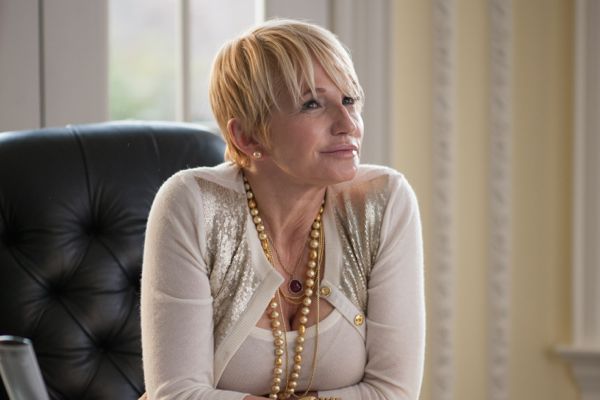Adam Sandler, Steve Buscemi, Ellen Barkin, Method Man & Director Tom McCarthy Talk THE COBBLER
- Details
- Category: Interviews
- Created: Sunday, 08 March 2015 23:52
- Published: Wednesday, 11 March 2015 07:30
- Written by Lupe R Haas
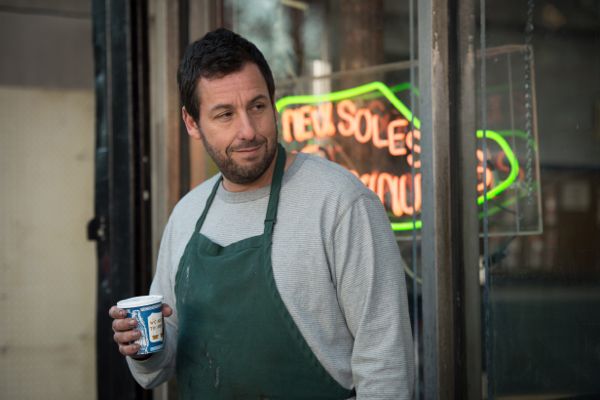
Adam Sandler steps into other people's shoes literally in his new movie THE COBBLER. Of course that begs the question of the cast of whose shoes they'd most like to step into. THE COBBLER star and co-stars Steve Buscemi, Ellen Barkin, Method Man and director Tom McCarthy talk about the themes of the movie and shooting in the actor's native city of New York City.
THE COBBLER opens March 13 in movie theaters.
Q: You guys are used to trying out other peoples’ lives for a living. What was it like exploring the idea of the entire look and really assuming the other person’s body?
Adam Sandler: It was very easy because once I put on the shoes another actor came in.
Q: But did you think about that idea of being in another person’s skin?
Steve Buscemi: Well, one of the first things I asked Tom, I asked, “How is this going to work?” Like do I do Dustin, and he said “No, because it’s your voice, and it’s the person who steps into those shoes sort of inhabits that person, so it’s like…I mean, I was very nervous thinking about it, and I just had to stop thinking about it. I can’t be Dustin, so—I’m walking here! It was pretty fun watching these guys play around with that, though, in their own different ways, have to deal with it or think about it. I think there was one moment, where we all got confused a bit, especially Dustin. I remember at one moment he said, “Am I me or am I Adam? I don’t know!”
Tom McCarthy: I think Fritz was the only guy who understood it all.
Q: Adam, in this movie, you get to become a lot of different people. In real life, if you could spend the day in someone else’s shoes, look like them, get away with whatever, who would it be and why?
Sandler: It would be grandma. Just the pleasure she has of making me soup. Just to see it from that side turning on the vaporizer when I’m sick. See what that must be like for her.
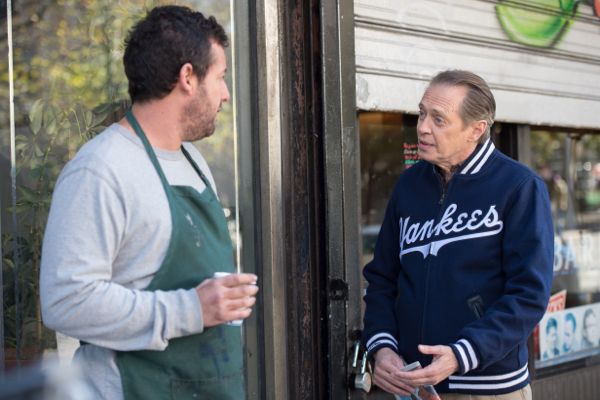
Q: One of the great things about the film being shot in New York is looking for the location. Were there any places you wanted to visit, or places you recognized?
Sandler: The lower east side was great to be shooting in, a lot of my family is from there. Good food, nice people, just brought back all the memories for me, just driving around New York and hanging out with my parents and always talking about “Grandma lived there,” and that kind of thing.
Ellen Barkin: I think it was nice to shoot downtown, on the lower east side because in some way it is the last place in the city that to me still looks like the New York I grew up in, and I think it’s just that little pocket. Just getting to the East Village, you are getting into a very different part of New York, so it was nostalgic in a lovely way and it also sort of angered me, as I walked around and thought, “Why don’t I live here anymore?”
Q: Tom, You recently wrote “Up,” which is about a helpless person whose house was taken over by big corporations. I was wondering, is this something you are writing about?
McCarthy: I guess so, yeah, I haven’t’ thought about it too much and that connection. But I do appreciate character. I live in TriBeCa right now, and they’re ripping down these little buildings and building glass towers now, but Ellen’s right: if you walk around the pockets in the lower east side where we shot, there are still vestiges of it, and it’s sad to see the city lose all that. I understand development is inevitable, but it is sad when you think that we are losing all of this charm and texture that is the very reason we chose to live here I the first place. It was fun working it into the story, have a context for it, so we could be lighthearted with it. Like all these shopkeepers and stuff, there something in geek side of me that really appreciates it and exploring that with these wonderful actors.
Q: How have your views on filmmaking changed since people will now be seeing things on a smaller screen? A lot of physical comedy in terms of the film; how would you tank to how much you suffered for your art?
Sandler: I’m just excited for people to see this movie, and I did see this movie in Toronto at a film festival on the big screen and there were a lot of people in the room and it was neat because it played like a comedy there were a lot of laughs and it is always fun in the theater, hearing group laughs, being on the same wave length and having a great time. And this movie is coming out in some theaters, right? Which will be cool to see. But the fact that you can see it at home, it’s great. You work hard, you make the best movie you can, and you just want as many people to watch it as possible, and it’s nice. I never want theater go away it is the greatest tie to go, it’s the greatest time out on the town, it’s a great place, great hand, date, a great place to hand with friends. But as an actor who works hard at making movies, I think that no matter what people can see movie on; it’s hard to keep a theater for long, there are so many movies, so, when you leave a theater—you’re just glad there’s a light fare for a movie.
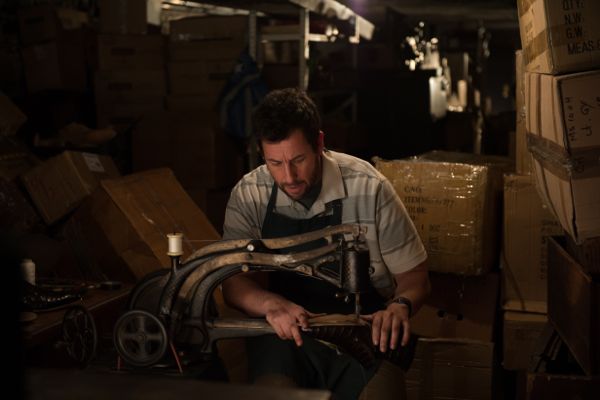
Q: Do any of you have bad landlord stories?
Sandler: My landlord now is always yelling at me. “Pay up. Where is your 250 bucks?” And I’m like, “My wife. She’s got it.”
Buscemi: I actually once talked my landlord down from rent, because I knew that he was overcharging me, because I got in the mail the previous tenant’s rent, and it was still a hundred bucks less than what I was paying. And I made a deal with him because I had two roommates, and he said I wasn’t supposed to have two roommates, so he let me have the two roommates and I also got the markdown, the hundred bucks.
Barkin: You know, I live on 12th street, right across from where the old St. Vincent’s was, so when I read the script, I had a very personal connection, because you know, where I live, I am watching the entire nature of my neighborhood change with the taking down of one building I mean it’s a big fucking building and it will change the entire neighborhood. Is it going to happen? Yeah. Can you stop it? I don’t know. But does it feel terrible? Yeah, it does. And most of the people on the block, who’ve been there for a while are all trying to get out as soon as they get in. You know, it’s just an interesting thing to think about. It’s like what Adam was saying about the VOD. Yes, going to the movies is a great experience, but you’re not going to stop now that there is a new way to watch movies, and more people get to watch it. I saw the movie both ways. I saw it in Toronto, and I saw it in my living room last night, and I have to say, it felt the same way. If it’s some IMAX movie then you want them to go to the theater, but this movie held up beautifully.
Q: This question is for Adam. If your character were to ask you for advice on how to be happier with his life, what advice would you give him? And to everyone else, what do you think would make a great double-feature with this film?
Sandler: How would I try, as Adam, to cheer up my character? I don’t know. I like that he is good at what he does—I can’t cobble as well as that guy. You know, he’s got a loving mom. He’s got the house, the bills that mom didn’t pay. I think the best thing he’s got going for him is the plastic on the couch. He doesn’t have to clean up if he spills. I’d just tell him “Everything is going to be alright, Max. Believe me. You’re a handsome man in a beard. Enjoy it.”
Barkin: I’m going to double-feature with “It’s a Wonderful Life.” I think it’s a same feel. Do you feel shoes say something about a person; do you think that shoes are important?
Buscemi: There was a big controversy about those shoes, because they weren’t the right time period.
When we shot the opening credits…but I still have people come up to me and say, “How could you walk in those shoes?”
Method Man: In my culture, it’s more or less like, that’s the first thing women look at. Women look at the build, and then they look at the shoes. If you don’t have nice shoes, you don’t have money. For me? It’s lawyers. First thing I’m looking at is his shoes. If he has good shoes, this dude’s getting money. We’re going to do this thing. If he has terrible shoes? Public defendant.
Barkin: I think, as an actor, the first thing I ask for is my character’s shoes. It’s the first thing I think on about myself, and it’s the first thing I work on with the costume designer, because I think it’s how you are grounded. I think it’s different if you’re wearing Aldo’s or a six-inch heel.
Does it matter? What type of shoes you wear?
Sandler: I don’t wear shoes a lot. When that happens, my vocabulary goes up. I feel like my father, like I’m worthy of having children. When I’m in my sneakers and my kids ask me a question, I say “Ask your mother.”
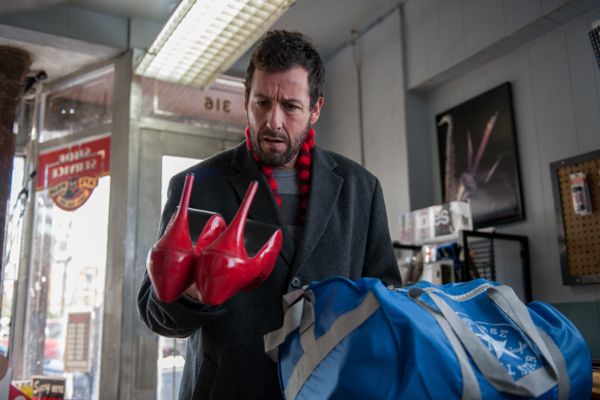
Q: When was the last time you wore shoes?
Sandler: I’m wearing shoes to the Saturday Night Live thing. I rented a tux—no, I bought a tux! They gave me shoes. That was the first thing I asked for.
Method Man: I got only one pair of shoes.
Sandler: One pair?
Method Man: One pair, I wear them everywhere.
Sandler: And the rest are sneakers?
Barkin: And how many pairs of sneakers do you have?
Method Man: Maybe about 50 pairs.
Buschemi: You could sell them on eBay.
Method Man: Nah.
Q: Have any of you had custom-made shoes?
Barkin: It feels like the most indulgent thing you could ever do. But when you do it, I thought I could give up five winter coats to do this again. My grandfather I remember had a pair of custom shoes, and I was thinking about it, and it’s because he had a cobbler. But it feels good, like they trace your foot on a piece of paper—it’s made for you.
Buscemi: I did have a pair of boots made for when I did “Boardwalk,” and same thing, they trace your foot on a piece of paper. These things hurt more than anything else. I could only wear them for one season, and then I said, “Please, I’m tired.” I don’t know what happened, it just didn’t work for me.
Sandler: I have custom orthopedics. They work well. I’m wearing them right now. I’ve got a question for you guys: when I was growing up, you just wore one pair of sneakers to shreds. When were you allowed to get the next pair? My parents were just like, once a year.
Barkin: Once a year.
Buscemi: I remember my first pair of sneakers. Flyers. The commercials for that were great: you felt you could jump higher.
Method Man: My first pair of sneakers was a pair of Paul McClydes.
Buscemi: Come on! They were your first?
Method Man: They were my first.
Buscemi: You were cool at that age.
Method Man: Before that, it was Buster Brown.
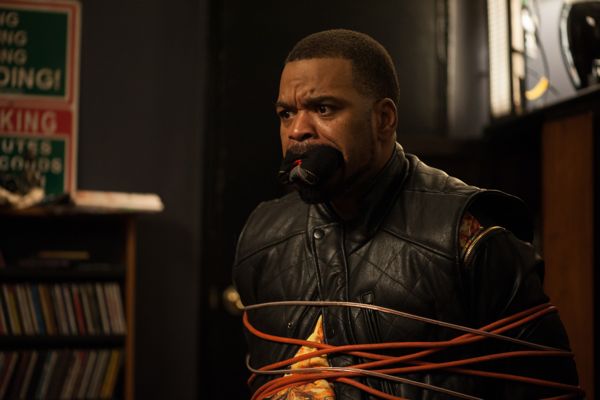
Q: What are the basic elements that turn a comedy into a classic?
McCarthy: I don’t know. If there was an equation for that, there would be a lot of classics right now. I think it has something to do with being original and how it connects with the audience. Adam spends a lot more time in the comedy world than I do, and I think he might have more answers on that. Whether it’s comedy or drama, or in this case a combo of both, our job is to keep telling stories and see where they land with audiences. See what how they continue on—movies and shows have long lives now. It stops there for me. Like I love making, I like collaborating with people and I love sharing with audiences, but then I sort of let go of it, and what happens, happens.
Sandler: To me, it helps to have Steve Buscemi here. My mother says to me, I swear to god, when I’m making a new movie, she says, “Oh, is Steve Buscemi in it?” “Yeah.” “Oh, then it’s going to be a good one.” I swear, every time. And when I say Steve’s not in it, she says, “Oh.”
Q: Just a follow-up on the comment about SNL. Can you comment about what it has meant to you as a fan and as an actor?
Sanler: You know, as kids, it was what we talked about. What was funny, Mr. Bill…everything about it rocked. It was cool. It was cool enough that your parents weren’t sure if you should be watching it, and then they were excited to get in there and you had to stay up late for it, so that was a big deal. Over the years, it’s there. It’s there you for you, it’s comforting, it’s exciting, you know it’s happening live. It’s an amazing thing. Forty years’ worth of meaning something. Everyone talks about it, if the show was good or bad. Even if a show falls flat, it’s still exciting to see you know that something’s happen. Pretty awesome.
Buscemi: I got to host twice, and I still can’t believe I hosted at all, and it was one of the most amazing, scary, and fun experiences. But before I got to that, Adam and I were doing “Airheads,” and I was invited to do a sketch. First sketch I was in, John Travolta was hosting and they did a “Welcome Back, Kotter” trailer as if it were directed by Quentin Tarantino. I come in at the very end, on the heels of Ellen and Squiggy, and I remember I came into rehearsal, and I had one line, and I blew it. I blew the line. I came in late, I blew the line. When I was hosting, I was like, how could I host when I blew my one line? Everyone around me carried me through, and it’s just incredible. Tomorrow night were going to the thing, and I am so excited.
Q: Tom, what message, if any, did you want to convey in terms of race?
McCarthy: Ultimately, I don’t know if I had a message to convey. I was just trying to reflect the New York around me. You know, we had a light-hearted approach to a lot of the themes in the movie, in terms of development and race and heritage and all that. So, I can’t say that I had a specific message, other than trying to represent a little bit. We all talked about that, like who was playing what. It was really more about character than anything else—and storyline. I wish I had a deeper answer to that, but it was really trying to be true to the characters as much as possible. So, when you live in New York that comes out—which is one of the great things about living in New York City. When you go to the lower east side, it’s just everyone, everyone’s there. We have every race, sex, heritage, country represented, it’s just what’s so great about the city.
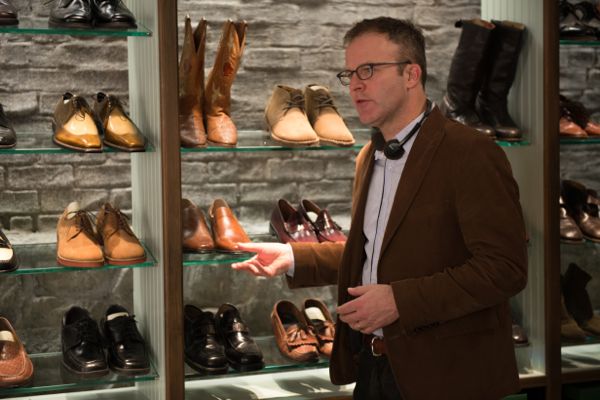
Q: With so many diverse and wacky characters in the story, Dustin Hoffman has a reputation of being an eccentric—who in the cast really made people laugh the most or goof off the most?
Sandler: Cliff brought a great energy. Ellen made me laugh all day—every other word was “f this” and “f that!” I loved it. Bruce Chandling was surprisingly not funny.
McCarthy: He was like the black hole. Certainly, no one up here liked Dan Stevens. Terrifically likable guy. When you get to write a really wacky story like this and get to call all these great actors and sit down with them and settle a script and say, “Hey, let’s go try and do this,” it’s a great privilege and you really get to have a lot of fun and we all worked really hard on it and no matter the story, we cared a lot and I think we all feel lucky. Adam has a way of quietly leading that way. He’s been doing that for a while because he’s good at it and he enjoys doing the hell out of it and he works very hard, so you know, he sort of sets the bar and we all have fun under that. And you have Dustin walking in, and he’s eccentric, but only because he cares so much about everything. We had a day of rehearsal, and he just cared about everything, every beat, every moment—he digs into everything, like Caligula. And it’s really, really, inspiring to watch a guy who’s been working that hard for so long at that level and bring it, still. It’s cool.
Q: Anyone have any good drag stories, since there was a transvestite in the story?
Method Man: He was a cool guy. I didn’t know he was trying to rattle me one day when we were in rehearsal and he kept grabbing my private area, so I told Tom, “Dude, we’re at rehearsal, could you tell him to tone it down a little bit?” But by the time we got on set, Tom had already given him the one-two one-two and he knew not to grab my genitalia. He was getting into it. Method, I guess. Dustin tied my shoe for me, because it was untied. He cares a lot, that guy. He cares a lot.
Q: Tom, I wanted to talk about the people who weren’t here today, your wonderful cast. I was wondering if you could talk more about the females in the cast?
McCarthy: Yeah, we were a little restricted by the shoes, 10 and a half and men’s shoes. But yeah, two terrific actresses. Melonie’s from the neighborhood, from the LES, grew up there, started acting there, and she’s working in Boston so she couldn’t be here. They are both working actresses who we love to have and are a lot of fun. Especially with Melonie’s character, that sort of straightforward eagerness of really trying to fight the system and that sort of relentless positive energy, I just found very appealing. She certainly connected with that character being from that neighborhood. All good things. A lot of wonderful actors. We’re lucky in that regard.
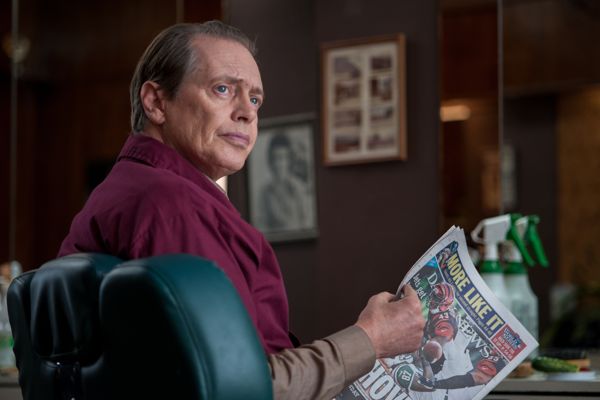
Q: Steve, how was it leaving “Boardwalk Empire” and are you seeking roles for a break in that regard?
Buscemi: It was hard to say goodbye to that character, but I also feel like I don’t know where we could’ve gone. I felt like five seasons were just the perfect amount of time to do for the show; I love playing the character and I certainly miss it, but it was time to move on.
Q: Were you deliberating looking for something not like that?
Buscemi: Well I don’t usually get offered that stuff so it wasn’t like, “No, I don’t do that anymore.” It was a real privilege to play him, but I like playing all kinds of characters. I was thrilled when I got the call from Adam and Tom do this, and I guess I don’t really think about it. I just see where this life leads the work and have fun.
McCarthy: When I was casting, first Adam, and Paul and I were talking about who we would pick for this role. Adam asked us who were thinking about and I said that I was really thinking about Buscemi, not realizing that these guys had known each other forever. It really paid off because these guys had a history together and sometimes you forget that these guys are used to working at such a high level and it’s cool to see where their careers intersect like that. It was fun to watch.
Barkin: From an actor’s point of view, Tom sent me the script and I said yes before I read the script. So I think there are directors who, when they approach you, it was about the movies he made, and I was like, “It’s Tom.”
